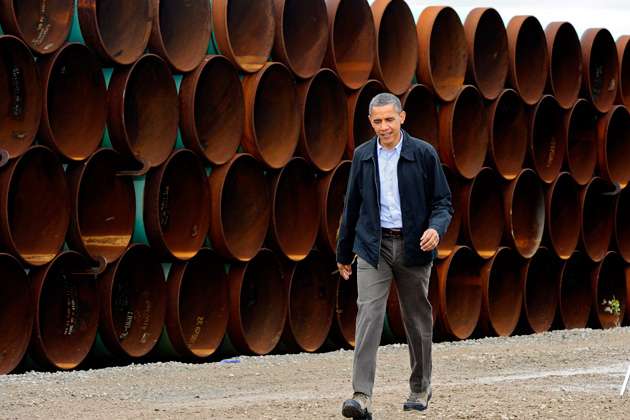In the past few years, debate has raged over the Keystone XL project, a 1,897 km pipeline between the tar sands in Alberta and Nebraska, in the U.S. While many have opposed the pipeline, largely on environmental grounds, a new report has been released by the U.S. State Department concluding that the pipeline would create a minimal increase to carbon emissions. Despite the nine-year-long debate over the pipeline, it is a decision that ultimately falls to U.S. President Barack Obama, as Canada has been in full-support since the beginning. However, even given the supposed short-term benefits, the environmental impact of the pipeline must be taken into account.
At first glance, there seems to be a compelling case for the pipeline. One argument put forth is that this pipeline would further reduce American reliance on the Middle East for oil. Another point is that the oil would still be extracted from the tar sands; the pipeline would simply make extraction an easier process. Furthermore, proponents argue, if the pipeline wasn’t built, railroads would instead take the bulk of oil, most likely transporting it to the same location, just in a less timely and safe fashion. Such an argument would seem to negate claims of environmental harm—the oil’s going somewhere anyway.
However, perhaps the most convincing argument for the pipeline is the alleged benefit to the economy. The State Department’s report claimed that 2,000 temporary jobs would be created for two years and then, once the project is completed, the pipeline could potentially support 40,000 permanent jobs. With unemployment in the U.S. still elevated, this type of economic opportunity is tempting even when accepting negative environmental consequences. For these reasons, the general belief is that Obama will approve the pipeline.
While these reasons for agreeing to the XL Pipeline seem legitimate, they overlook major problems. The State Department’s finding that carbon emissions would not be largely affected is based on the assumption that the oil extraction would occur either way. This assumption is not necessarily true, as shown by an executive of Cenovus Energy, another company involved in the oil sands, who reportedly said, “If there were no more pipeline expansions, I would have to slow down.” This slow down in extraction would benefit the environment overall. There would be fewer carbon emissions as well as a stronger push for alternative energy sources with oil not as readily available. While our reliance on oil will remain for many years, making access easier will only lengthen the process towards cleaner energy. Railroads would be used in place of the pipeline, but that is more laborious, and thus, production would slow. Additionally, potential investors may be less willing to invest if there does not seem to be any progress with oil exploration.
While it is true that jobs would increase with the pipeline installation, there is a question of what we value: job security now or the security of our planet later? We need to look to the future, because the repercussions are great, and the impact not easily reversed.








What an absurd thesis promoted by this article. Even the agencies required to wade in with opinioons on this issue have found that Obama’s intrasigence is 100% political – not scientific in basis.
Canada will trasnport her resources in whatever way is needed to provide the energy hungry peoples of the world with power. If not the USA, then China or a myriad of European nations. The point – the world will use every drop of the oil and more.
Obama knows this – that is why his position is a fraud.
That a Canadian would even think of arguiing this is frightful. If you don’t understand geopolitical energy needs and solutions, what are you doing in university? One would suggest that you need a bit of time in real life living and working before pontificating in such an idealisitically naive fashion.
In other words – grow up!!
Obama is merely kowtowing to radical environmentalists who follow the global warming religion. Too these clowns, anything that promotes the use of fossill fuels is a threat to the continuation of life on earth. It’s all based on the fraudulent notion that CO2 is the cause of warming. I defy anyone to discern the role of CO2 among all the natural forces, including solar activity, the earth’s elliptical orbit, axial tilt, precession wobble, the effect of cosmic rays of cloud cover, the Atlantic and Pacific oscillations, volcanic activity, etc. on a complex climate mechanism that produced barely a one-third of a degree rise in globally averaged temperature from 1978-1997, after wihch we have seen no discernible increase in temperature for 17 years. It is, in fact, the greatest scientific hoax in history.